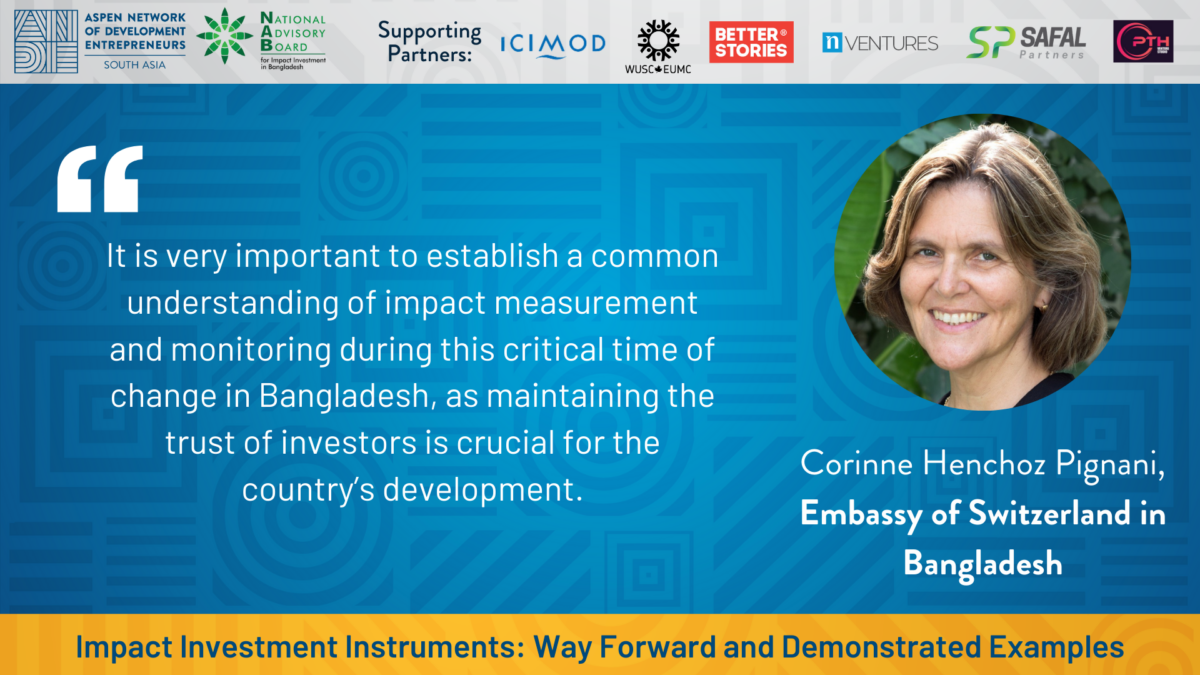
Accelerating Impact Investment and Strengthening Regulatory Frameworks – Impact InvesTREND Day
Discussions explored impact investment strategies, financial transparency, and regulatory frameworks to drive sustainable development in South Asia.
December 5 and the final day of the ANDE South Asia Convening 2024 focused on the mechanics of impact investment—how to scale financial innovations, increase transparency, and create regulatory environments that empower small businesses and underserved communities. As investors and policymakers push for sustainable development, ensuring that capital is channeled effectively into high-impact sectors remains critical. Day 3’s discussions provided a blueprint for leveraging financial tools, enhancing accountability, and fostering an inclusive investment ecosystem across the region.
Session 1: Impact Investment Instruments: Way Forward and Demonstrated Examples

Arastoo Khan (NAB Bangladesh) opened the discussion by emphasizing the need to standardize due diligence processes and amplify impact narratives to attract investors. He highlighted Bangladesh’s progress in impact investing and the importance of fostering inclusion.
Corinne Henchoz Pignani (Embassy of Switzerland in Bangladesh) reflected on Switzerland’s contributions to Bangladesh’s impact investment landscape, including gender-lens investing and scalable enterprise financing. She stressed the importance of maintaining investor trust through standardized impact measurement.

Chandula Abeywickrema (NAB Sri Lanka) discussed South Asia’s shift from debt-based financing to equity investments, underlining the role of small-ticket investments in creating scalable businesses. Simmi Sareen (Unitus Capital, India) introduced innovative financial structures such as credit guarantees and social impact bonds, which help bridge climate funding gaps.
Ashutosh Tiwari (Safal Partners, Nepal) explored Nepal’s emerging investment landscape and the challenges in introducing venture debt. He emphasized the need for case studies to attract global investors. The session closed with a call to action: South Asia must continue experimenting with financial instruments that align with its unique economic realities.

Session 2: Impact Transparency and Scale-Up: Reinforcing Impact Audits, Measurements, Management, and Reporting
As impact investing moves toward the mainstream, transparency and accountability have become essential for investor confidence and long-term sustainability.
Erad Kawsar (Build Bangladesh) highlighted the rapid growth of impact investing and the importance of establishing robust audit and reporting mechanisms. Tomoya Shiraishi (Phronesis Partners, Japan) introduced the concept of holistic impact management, advocating for systematic approaches to measuring social and environmental outcomes.
Şevki Mert Barış (TIKA) emphasized the value of direct beneficiary feedback in measuring impact. He argued that qualitative measures, such as improvements in well-being and economic stability, are as crucial as quantitative data.
Ahmed Mottaki (Mianz International Group, Maldives) shared insights on integrating impact assessment into early childhood education and local agricultural programs. By embedding accountability into program design, impact-driven enterprises can ensure long-term sustainability and community benefits.

Session 3: Regulatory Frameworks: Supporting Investors, Investees, Intermediaries, and Untapped Markets
The session delved into how regulatory systems can better support impact investors and entrepreneurs while ensuring that capital reaches high-impact sectors.
Anita Ghazi Rahman (The Legal Circle, Bangladesh) explored the rise of regulatory innovations, including the projected $6 trillion growth of impact investing over the next decade. Amrut Joshi (Gamechanger Law, India) detailed India’s Social Stock Exchange, which enables non-profits to access funding through publicly listed zero-coupon, zero-principal bonds.
Kenny Lee (MyImpact, Malaysia) highlighted Malaysia’s value-based intermediation framework, which incentivizes banks to provide lower-rate financial products to social enterprises. Mubariz Siddiqui (Carbon Law, Pakistan) discussed the challenges of securing foreign investments in Pakistan, emphasizing the need for regulatory reforms that balance investor protection with capital accessibility.

Looking Ahead
Day 3 of #SAC2024 underscored the need for financial innovation, investment transparency, and policy-driven regulatory support to accelerate impact-driven business growth in South Asia. With impact investing on the rise, ensuring accountability and effective capital allocation will be crucial. As stakeholders leave the convening inspired by new ideas and models, the real challenge begins: transforming these insights into action and driving tangible, long-term impact.
The ANDE South Asia Convening 2024 showcased the passion and collaboration driving South Asian entrepreneurship. Through inspiring discussions and forward-thinking sessions, it’s clear that the region is on the path toward a more resilient and sustainable future. The knowledge and ideas shared will no doubt continue to inspire impactful change across South Asia’s entrepreneurial ecosystem.
With bigger ideas, bolder conversations, and even more passionate changemakers, we can’t wait to see what the future holds for South Asian entrepreneurship. See you in 2025—let’s continue this journey of transformation together!
